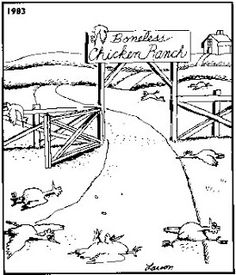(Artisanal Chicken Ranch, Part I)
After years of pressure from independent small-flock chicken farmers, as well as from NFU, PFO, Sustain Ontario, and Eat Local Sudbury, and after province-wide consultations on what to do with new growth opportunities, Chicken Farmers of Ontario has crafted a potentially marvellous new Artisanal Chicken Policy (pdf 276 kB), and released it yesterday.
CFO to grow local food communities with new ‘Artisanal Chicken’ program launch
BURLINGTON, ON – July 28, 2015 – Chicken Farmers of Ontario (CFO) has announced a portfolio of new programs that will support expanded business opportunities for chicken farmers and offer Ontario consumers even more choice in accessing locally grown, high quality chicken. The new business opportunities were developed following the recent farmer, public and industry ‘Allocating Growth’ consultations, and includes an ‘Artisanal Chicken’ program which will appeal to smaller, independent, family farmers looking to meet local markets. Read more…
This means the former Small Flock Exemption policy —which remains at 300— is now the Family Food Program, language that will more clearly align with the intent of the exemption: on-farm consumption or farm-gate sales.
The Artisanal Chicken Program on the other hand “…is directed at those farmers who are interested in growing between 600 and 3,000 chickens annually for select target markets such as local farmer markets.”
The closing date for submissions for 2016 Applications is September 4, 2015.
CFO will also be creating a quota-based Local Niche Markets program for those wishing to graduate from the Artisinal Program “to support those larger niche or regional markets of 6,000 chickens or more per year”.
 … And as with any such program, the devil will be in the details. There are already questions about the fine print—like how will “traditional methods” fly with On-Farm Food Safety Assurance and Animal Care Programs, to provide mutually acceptable, appropriate and complementary levels of on-farm safety, security and viability?
… And as with any such program, the devil will be in the details. There are already questions about the fine print—like how will “traditional methods” fly with On-Farm Food Safety Assurance and Animal Care Programs, to provide mutually acceptable, appropriate and complementary levels of on-farm safety, security and viability?
The dust has yet to settle on this newly released policy. Hopefully, we will have some answers to relay in Artisanal Chicken Ranch Part II…
